操作系统课程设计
大学生操作系统课程设计

大学生操作系统课程设计一、教学目标本课程的教学目标分为三个维度:知识目标、技能目标和情感态度价值观目标。
1.知识目标:通过本课程的学习,学生需要掌握操作系统的基本概念、原理和关键技术,包括进程管理、内存管理、文件系统和输入/输出系统等。
2.技能目标:培养学生具备操作系统实验操作和程序设计的能力,能够运用所学知识分析和解决实际问题。
3.情感态度价值观目标:培养学生对操作系统学科的兴趣和热情,培养学生的创新意识和团队合作精神。
二、教学内容本课程的教学内容主要包括操作系统的基本概念、原理和关键技术。
1.教材章节:(1)引言和概述(2)进程管理(3)内存管理(4)文件系统(5)输入/输出系统(6)并发程序设计(7)操作系统安全与保护2.具体内容:(1)操作系统的定义、作用和分类(2)进程的基本概念、状态和控制(3)进程同步与互斥(4)死锁与饥饿(5)内存分配与回收策略(6)虚拟内存技术(7)文件和目录结构(8)文件访问控制和保护(9)输入/输出管理(10)操作系统用户接口三、教学方法本课程采用多种教学方法相结合,以提高学生的学习兴趣和主动性。
1.讲授法:用于传授基本概念、原理和方法。
2.讨论法:鼓励学生积极参与课堂讨论,培养学生的思考和分析能力。
3.案例分析法:通过分析实际案例,使学生更好地理解和掌握操作系统原理。
4.实验法:培养学生动手实践能力,巩固所学知识。
四、教学资源1.教材:选用国内外优秀教材,如《操作系统概念》、《现代操作系统》等。
2.参考书:提供相关领域的参考书籍,丰富学生的知识体系。
3.多媒体资料:制作课件、教学视频等,提高课堂教学效果。
4.实验设备:配置充足的实验设备,确保学生能够充分进行实践操作。
五、教学评估本课程的教学评估采用多元化的评价方式,包括平时表现、作业、考试等,以全面客观地评价学生的学习成果。
1.平时表现:通过课堂参与、提问、讨论等方式,评估学生的学习态度和思考能力。
2.作业:布置适量的作业,评估学生对知识点的理解和运用能力。
windows操作系统核心编程实验教程课程设计
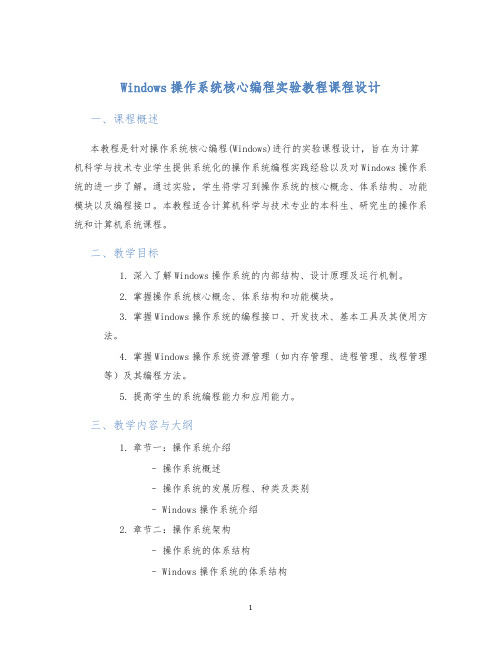
Windows操作系统核心编程实验教程课程设计一、课程概述本教程是针对操作系统核心编程(Windows)进行的实验课程设计,旨在为计算机科学与技术专业学生提供系统化的操作系统编程实践经验以及对Windows操作系统的进一步了解。
通过实验,学生将学习到操作系统的核心概念、体系结构、功能模块以及编程接口。
本教程适合计算机科学与技术专业的本科生、研究生的操作系统和计算机系统课程。
二、教学目标1.深入了解Windows操作系统的内部结构、设计原理及运行机制。
2.掌握操作系统核心概念、体系结构和功能模块。
3.掌握Windows操作系统的编程接口、开发技术、基本工具及其使用方法。
4.掌握Windows操作系统资源管理(如内存管理、进程管理、线程管理等)及其编程方法。
5.提高学生的系统编程能力和应用能力。
三、教学内容与大纲1.章节一:操作系统介绍–操作系统概述–操作系统的发展历程、种类及类别–Windows操作系统介绍2.章节二:操作系统架构–操作系统的体系结构–Windows操作系统的体系结构–操作系统模式(内核模式和用户模式)3.章节三:进程管理–进程概念–进程状态和状态转换–进程控制块–进程调度–进程同步与通信实现(如互斥量、信号量、管道等)–进程编程实践4.章节四:线程管理–线程概念和状态转换–线程控制块–线程同步与通信实现–线程编程实践5.章节五:内存管理–内存概述和内存分区–虚拟存储器和页面交换–内存管理实现(页式管理、段式管理)–内存编程实践6.章节六:设备管理–设备管理概述–Windows I/O管理模型–设备驱动程序开发–设备编程实践四、教学方法采用课堂讲授和实践操作相结合的教学方法,注重培养学生的动手能力和创新意识。
主讲教师将通过讲解操作系统原理和编程知识,来进行基础理论的传授,同时也会通过实践操作来加深理解,提高实际操作能力。
五、实验环境本教程主要使用Visual Studio 2017作为开发工具,配合Windows 10操作系统进行实验。
《操作系统》课程设计
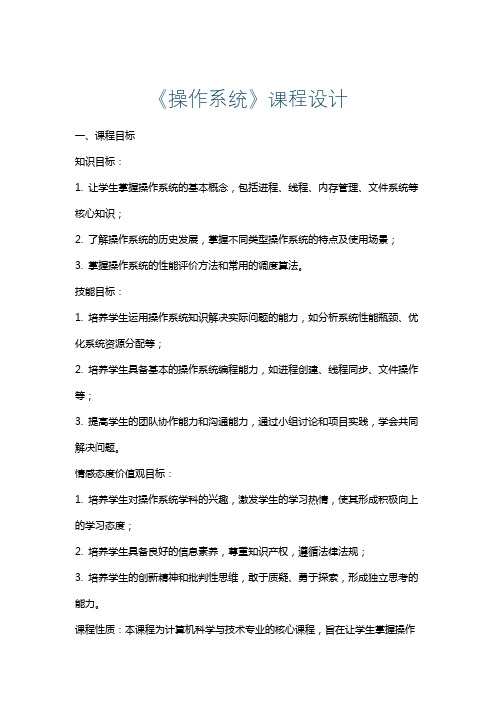
《操作系统》课程设计一、课程目标知识目标:1. 让学生掌握操作系统的基本概念,包括进程、线程、内存管理、文件系统等核心知识;2. 了解操作系统的历史发展,掌握不同类型操作系统的特点及使用场景;3. 掌握操作系统的性能评价方法和常用的调度算法。
技能目标:1. 培养学生运用操作系统知识解决实际问题的能力,如分析系统性能瓶颈、优化系统资源分配等;2. 培养学生具备基本的操作系统编程能力,如进程创建、线程同步、文件操作等;3. 提高学生的团队协作能力和沟通能力,通过小组讨论和项目实践,学会共同解决问题。
情感态度价值观目标:1. 培养学生对操作系统学科的兴趣,激发学生的学习热情,使其形成积极向上的学习态度;2. 培养学生具备良好的信息素养,尊重知识产权,遵循法律法规;3. 培养学生的创新精神和批判性思维,敢于质疑、勇于探索,形成独立思考的能力。
课程性质:本课程为计算机科学与技术专业的核心课程,旨在让学生掌握操作系统的基本原理和实现方法,提高学生的系统分析和编程能力。
学生特点:学生具备一定的编程基础和计算机系统知识,具有较强的逻辑思维能力和动手实践能力。
教学要求:结合学生特点和课程性质,注重理论与实践相结合,通过案例分析和项目实践,帮助学生将所学知识内化为具体的学习成果。
在教学过程中,关注学生的学习进度和反馈,及时调整教学策略,确保课程目标的实现。
二、教学内容1. 操作系统概述:介绍操作系统的定义、发展历程、功能、类型及特点,对应教材第一章内容。
- 操作系统的起源与发展- 操作系统的功能与类型- 操作系统的主要特点2. 进程与线程:讲解进程与线程的概念、状态、调度算法,对应教材第二章内容。
- 进程与线程的定义与区别- 进程状态与转换- 进程调度算法3. 内存管理:分析内存管理的基本原理、策略和技术,对应教材第三章内容。
- 内存分配与回收策略- 虚拟内存技术- 页面置换算法4. 文件系统:介绍文件系统的基本概念、结构、存储原理,对应教材第四章内容。
操作系统概念-Java实现第七版课程设计

操作系统概念-Java实现第七版课程设计简介本文是一篇关于操作系统概念-Java实现第七版课程设计的文档。
操作系统概念是计算机科学中非常重要的一门课程,而Java是一种广泛使用的编程语言,结合二者,为学生提供了快速而有效的学习操作系统的方式。
本文将介绍如何在课程设计中使用Java实现操作系统概念。
设计目标本课程设计的主要目标是让学生掌握操作系统的基本概念和原理,并能够设计和实现简单的操作系统。
本课程设计分为两个部分:1.操作系统基本概念的学习和理解。
2.使用Java语言实现一个简单的操作系统。
设计内容操作系统基本概念的学习和理解学生需要掌握以下操作系统基本概念:1.操作系统的定义和发展历程。
2.操作系统的组成和功能。
3.进程和线程。
4.内存管理。
5.IO管理。
6.文件系统。
学生可以通过教材、PPT等渠道学习相关知识,并进行课堂讲解、案例分析和小组讨论等形式的教学,以提高学生对操作系统基本概念的掌握和理解。
使用Java语言实现一个简单的操作系统在掌握了操作系统的基本概念之后,学生需要使用Java语言实现一个简单的操作系统。
该操作系统需要包括以下功能:1.进程管理:创建进程、销毁进程、进程间的通信等。
2.内存管理:分配内存、释放内存等。
3.IO管理:读取文件、写入文件、创建文件、删除文件等。
学生可以使用Java语言编写相关代码,并进行调试和优化,以实现一个功能完整的操作系统。
设计过程本课程设计的实现过程可以分为以下几个步骤:1.学生自学操作系统基本概念。
2.学生分组进行操作系统设计和实现工作。
3.分组内成员进行相互协作,完成进程管理、内存管理和IO管理等功能模块的编写。
4.教师进行评价、检查和指导。
设计效果通过本课程设计,学生可以:1.掌握操作系统的基本概念和原理。
2.熟悉Java语言的使用。
3.获得实际操作系统设计和实现的经验。
4.培养学生的分析和解决问题的能力。
总结本文介绍了如何使用Java语言实现操作系统概念课程设计,包括课程设计目标、设计内容、设计过程和设计效果。
操作系统课程设计项目参考

滴加碘液后
滴加碘液前
12/12/2021
第十二页,共二十三页。
消化(xiāohuà):在消化道内将食物分解成可吸收 (xīshōu)的成分的过程
(包括物理性消化和化学性消化)
吸收(xīshōu):营养物质通过消化道壁进入循环 系统的过程
12/12/2021
第十三页,共二十三页。
消化(xiāohuà)和吸收的过程
12/12/2021
第十九页,共二十三页。
练习(liànxí)
• 2、分析数据,指出(zhǐ chū)哪一部分消化道中消化液最多。
• 在每天摄入800克食物和1200毫升水的情况下, 消化腺大致分泌以下数量消化液。 1500毫升唾液 2000毫升胃液 1500毫升肠液 500毫升胆汁 1500毫升胰液
12/12/2021
第二十二页,共二十三页。
内容 总结 (nèiróng)
第二节。食物中的营养物质是在消化系统中被消化和吸收的。这粒西瓜籽在姗姗的消化道内, 经过了难忘的时光。它先遇到像轧钢机似的上、下尖硬的怪物,差点儿将它压得粉身碎骨。后来它
No 钻进了一条(yī tiáo)又长又窄的迷宫,它在这里走了很久,身边的许多物质都神秘地消失了。走出迷
唾液腺、胃腺(wèixiàn)、肝脏、胰腺、肠腺
1、淀粉在__口__腔__开始消化、蛋白质在____开始胃消化、脂肪在_______开始 消小化肠。
2、胆汁是一种消化液,但不含消化酶,起乳化脂肪的作用。
二、人体消化、吸收的主要器官—— _____小肠 能 训 练解
胰脏:分泌(fēnmì)胰液 肠腺:分泌肠液
肝脏:最大的腺体,分泌胆汁。 胆汁无消化酶,有乳化脂肪 的
作用。
第七页,共二十三页。
操作系统多线程课程设计

操作系统多线程课程设计一、课程目标知识目标:1. 理解操作系统中多线程的基本概念,掌握线程的创建、同步与通信机制;2. 学会分析多线程程序的性能与问题,了解常见线程同步问题的解决方案;3. 掌握操作系统级别线程调度的基本原则和方法。
技能目标:1. 能够运用所学知识,设计并实现简单的多线程程序;2. 能够运用同步机制,解决多线程中的竞态条件和死锁问题;3. 能够对多线程程序进行性能分析,并提出优化方案。
情感态度价值观目标:1. 培养学生对操作系统多线程技术的兴趣,激发他们探索计算机科学领域的热情;2. 培养学生团队合作意识,学会在团队项目中分工与协作;3. 培养学生面对复杂问题时的分析能力、解决问题的能力和创新精神。
课程性质:本课程为计算机科学与技术专业高年级选修课,旨在帮助学生深入理解操作系统中多线程技术,提高他们解决实际问题的能力。
学生特点:学生具备一定的编程基础和操作系统基本知识,具备独立分析和解决问题的能力。
教学要求:结合实际案例,注重理论与实践相结合,提高学生的动手能力和实际应用能力。
通过课程学习,使学生能够将多线程技术应用于实际项目中,提高软件性能。
二、教学内容1. 多线程基本概念:线程的定义、线程与进程的关系、线程的创建与销毁;2. 线程同步与通信:互斥锁、条件变量、信号量、管程等同步机制,线程间通信方式;3. 线程调度:调度算法、时间片轮转、优先级调度、多级反馈队列调度等;4. 多线程程序设计:多线程编程模型、线程池、线程局部存储、多线程并发控制;5. 常见线程同步问题及解决方案:竞态条件、死锁、饥饿、活锁等;6. 性能分析与优化:多线程程序性能指标、性能瓶颈分析、优化策略;7. 实践环节:结合实际案例,设计并实现多线程程序,分析并优化性能。
教学内容依据教材相关章节组织,具体安排如下:第一周:多线程基本概念,线程创建与销毁;第二周:线程同步与通信,互斥锁、条件变量、信号量等;第三周:线程调度,调度算法;第四周:多线程程序设计,线程池、线程局部存储;第五周:常见线程同步问题及解决方案;第六周:性能分析与优化;第七周:实践环节,课程总结与展示。
操作系统课程设计pintos
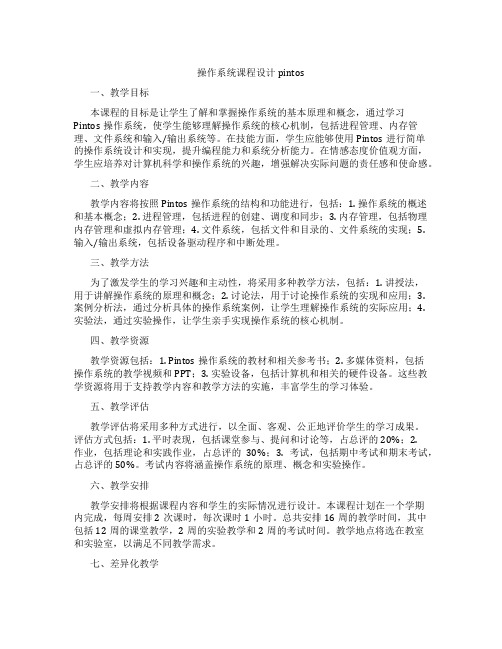
操作系统课程设计pintos一、教学目标本课程的目标是让学生了解和掌握操作系统的基本原理和概念,通过学习Pintos操作系统,使学生能够理解操作系统的核心机制,包括进程管理、内存管理、文件系统和输入/输出系统等。
在技能方面,学生应能够使用Pintos进行简单的操作系统设计和实现,提升编程能力和系统分析能力。
在情感态度价值观方面,学生应培养对计算机科学和操作系统的兴趣,增强解决实际问题的责任感和使命感。
二、教学内容教学内容将按照Pintos操作系统的结构和功能进行,包括:1. 操作系统的概述和基本概念;2. 进程管理,包括进程的创建、调度和同步;3. 内存管理,包括物理内存管理和虚拟内存管理;4. 文件系统,包括文件和目录的、文件系统的实现;5. 输入/输出系统,包括设备驱动程序和中断处理。
三、教学方法为了激发学生的学习兴趣和主动性,将采用多种教学方法,包括:1. 讲授法,用于讲解操作系统的原理和概念;2. 讨论法,用于讨论操作系统的实现和应用;3. 案例分析法,通过分析具体的操作系统案例,让学生理解操作系统的实际应用;4. 实验法,通过实验操作,让学生亲手实现操作系统的核心机制。
四、教学资源教学资源包括:1. Pintos操作系统的教材和相关参考书;2. 多媒体资料,包括操作系统的教学视频和PPT;3. 实验设备,包括计算机和相关的硬件设备。
这些教学资源将用于支持教学内容和教学方法的实施,丰富学生的学习体验。
五、教学评估教学评估将采用多种方式进行,以全面、客观、公正地评价学生的学习成果。
评估方式包括:1. 平时表现,包括课堂参与、提问和讨论等,占总评的20%;2.作业,包括理论和实践作业,占总评的30%;3. 考试,包括期中考试和期末考试,占总评的50%。
考试内容将涵盖操作系统的原理、概念和实验操作。
六、教学安排教学安排将根据课程内容和学生的实际情况进行设计。
本课程计划在一个学期内完成,每周安排2次课时,每次课时1小时。
操作系统课程设计题目

-操作系统性能调优策略
-多处理器系统
-多处理器系统的基本概念
-并行与分布式计算
-实时操作系统
-实时操作系统的特点与需求
-实时调度算法
-操作系统中的并发控制
-并发的基本概念
-互斥与同步机制
-课程设计进阶项目
-设计并实现一个简单的实时操作系统
-研究并发控制策略在操作系统中的应用
-分析多处理器系统中的负载均衡问题
4.章节四:内存管理
-内存分配与回收策略
-虚拟内存与分页机制
5.章节五:设备管理
-设备管理的基本原理
- I/O调度策略
6.章节六:文件系统
-文件与目录结构
-文件存储与访问控制
2、教学内容
-文件系统性能优化
-磁盘空间分配策略
-磁盘碎片整理方法
-操作系统安全性
-访问控制机制
-加密与认证技术
-操作系统实例分析
-探索操作系统在移动设备、物联网等新兴领域的应用案例
4、教学内容
-操作系统接口与用户交互
-命令行接口(CLI)与图形用户界面(GUI)
-操作系统提供的系统调用与服务
-操作系统的网络功能
-网络协议栈的基础知识
-操作系统在网络通信中的作用
-操作系统的虚拟化技术
-虚拟化技术的原理与应用
-虚拟机监控器(VMM)的作用与分类
-探讨操作系统在人机交互方面的未来发展趋势
-评估开源操作系统的标准化程度及其对行业的影响
操作系统课程设计题目
一、教学内容
本章节内容来自《操作系统》课程,针对高二年级学生,选择以下课程设计题目:
1.章节一:操作系统概述
-操作系统Hale Waihona Puke 基本概念-操作系统的历史与发展
课程设计操作系统
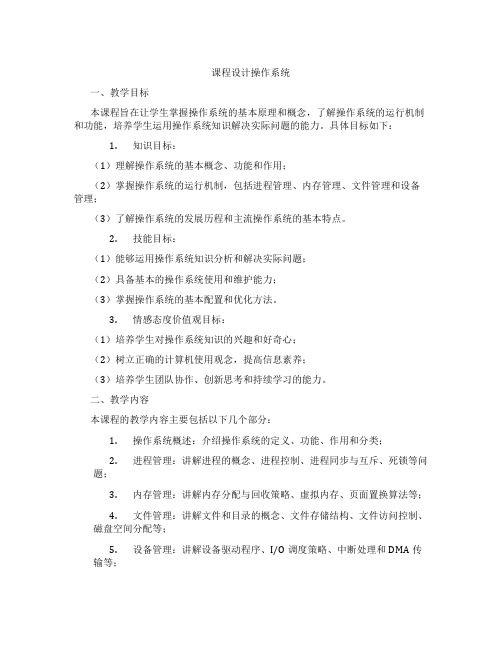
课程设计操作系统一、教学目标本课程旨在让学生掌握操作系统的基本原理和概念,了解操作系统的运行机制和功能,培养学生运用操作系统知识解决实际问题的能力。
具体目标如下:1.知识目标:(1)理解操作系统的基本概念、功能和作用;(2)掌握操作系统的运行机制,包括进程管理、内存管理、文件管理和设备管理;(3)了解操作系统的发展历程和主流操作系统的基本特点。
2.技能目标:(1)能够运用操作系统知识分析和解决实际问题;(2)具备基本的操作系统使用和维护能力;(3)掌握操作系统的基本配置和优化方法。
3.情感态度价值观目标:(1)培养学生对操作系统知识的兴趣和好奇心;(2)树立正确的计算机使用观念,提高信息素养;(3)培养学生团队协作、创新思考和持续学习的能力。
二、教学内容本课程的教学内容主要包括以下几个部分:1.操作系统概述:介绍操作系统的定义、功能、作用和分类;2.进程管理:讲解进程的概念、进程控制、进程同步与互斥、死锁等问题;3.内存管理:讲解内存分配与回收策略、虚拟内存、页面置换算法等;4.文件管理:讲解文件和目录的概念、文件存储结构、文件访问控制、磁盘空间分配等;5.设备管理:讲解设备驱动程序、I/O调度策略、中断处理和DMA传输等;6.操作系统实例分析:分析主流操作系统(如Windows、Linux)的基本特点和运行机制。
三、教学方法本课程采用多种教学方法相结合,以提高学生的学习兴趣和主动性:1.讲授法:讲解操作系统的基本概念、原理和知识点;2.讨论法:学生针对操作系统相关问题进行讨论,培养学生的思维能力和团队协作精神;3.案例分析法:分析实际案例,让学生了解操作系统在实际应用中的作用和意义;4.实验法:安排实验课程,让学生动手实践,巩固所学知识。
四、教学资源为实现课程目标,我们将采用以下教学资源:1.教材:选用权威、实用的操作系统教材,为学生提供系统、全面的知识体系;2.参考书:提供相关领域的参考书籍,拓展学生的知识视野;3.多媒体资料:制作精美的PPT课件,辅助讲解和展示操作系统的相关概念和实例;4.实验设备:配置相应的实验设备,让学生动手实践,提高操作能力。
操作系统课程设计
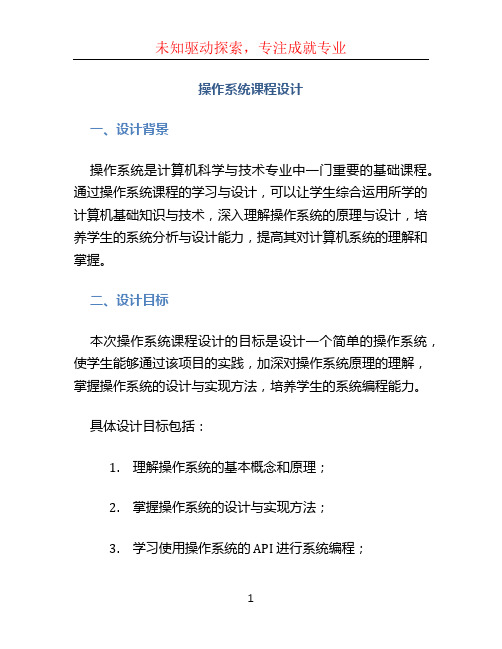
一、设计背景
操作系统是计算机科学与技术专业中一门重要的基础课程。通过操作系统课程的学习与设计,可以让学生综合运用所学的计算机基础知识与技术,深入理解操作系统的原理与设计,培养学生的系统分析与设计能力,提高其对计算机系统的理解和掌握。
二、设计目标
本次操作系统课程设计的目标是设计一个简单的操作系统,使学生能够通过该项目的实践,加深对操作系统原理的理解,掌握操作系统的设计与实现方法,培养学生的系统编程能力。
•进程管理模块:负责进程的创建、终止、调度等操作;
•内存管理模块:负责内存的分配与回收,实现虚拟内存管理;
•文件系统模块:负责文件的创建、打开、读写等操作;
•输入输出模块:负责处理输入输出设备的控制与数据传输。
2.
学生需要选择一种合适的进程调度算法,结合自己设计的操作系统,实现进程的调度与管理。可以选择的调度算法包括FCFS、SJF、RR、优先级调度等。
五、完成时间
学生需要根据教师的要求,按时完成操作系统课程设计的所有任务。完成时间一般为一个学期,具体时间安排由教师决定。
六、评价方法
学生的操作系统课程设计将进行评价,根据以下几个方面进行评分:
•设计报告质量:包括设计思路、实现方法和测试结果的描述与分析;
•系统功能完整性:系统的各个功能是否齐全并能正常运行;
•系统性能优化:是否进行了系统性能的优化,提高了系统的性能;
•代码质量:代码的规范性、可读性和可维护性;
•团队合作能力:学生在项目中的团队合作表现等。
七、ቤተ መጻሕፍቲ ባይዱ结
操作系统课程设计是一项重要的实践性项目,通过对操作系统的实际设计与实现,学生既可以提高对操作系统原理的理解,又可以培养系统编程与分析问题的能力。通过本次设计,学生可以更加深入地掌握操作系统的各个方面,为以后从事相关工作打下坚实的基础。
操作系统安全课程设计
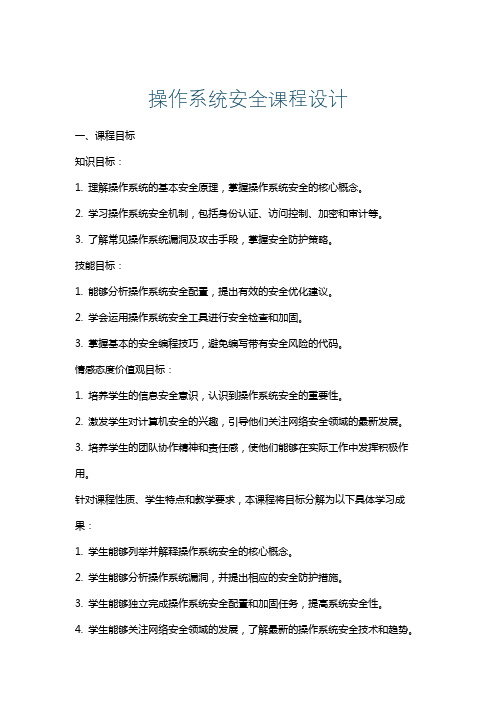
操作系统安全课程设计一、课程目标知识目标:1. 理解操作系统的基本安全原理,掌握操作系统安全的核心概念。
2. 学习操作系统安全机制,包括身份认证、访问控制、加密和审计等。
3. 了解常见操作系统漏洞及攻击手段,掌握安全防护策略。
技能目标:1. 能够分析操作系统安全配置,提出有效的安全优化建议。
2. 学会运用操作系统安全工具进行安全检查和加固。
3. 掌握基本的安全编程技巧,避免编写带有安全风险的代码。
情感态度价值观目标:1. 培养学生的信息安全意识,认识到操作系统安全的重要性。
2. 激发学生对计算机安全的兴趣,引导他们关注网络安全领域的最新发展。
3. 培养学生的团队协作精神和责任感,使他们能够在实际工作中发挥积极作用。
针对课程性质、学生特点和教学要求,本课程将目标分解为以下具体学习成果:1. 学生能够列举并解释操作系统安全的核心概念。
2. 学生能够分析操作系统漏洞,并提出相应的安全防护措施。
3. 学生能够独立完成操作系统安全配置和加固任务,提高系统安全性。
4. 学生能够关注网络安全领域的发展,了解最新的操作系统安全技术和趋势。
5. 学生能够在团队项目中发挥积极作用,共同提高操作系统安全水平。
二、教学内容1. 操作系统安全概述- 了解操作系统的基本概念、发展历程和常见类型。
- 掌握操作系统安全的重要性及安全风险。
2. 操作系统安全机制- 学习身份认证、访问控制、加密和审计等核心安全机制。
- 分析各类安全机制的原理和作用。
3. 常见操作系统漏洞与攻击手段- 列举常见的操作系统漏洞,如缓冲区溢出、权限提升等。
- 了解攻击手段,如病毒、木马、拒绝服务和网络攻击等。
4. 安全防护策略与工具- 学习操作系统安全防护策略,如最小权限原则、安全配置等。
- 了解并运用操作系统安全工具,如防火墙、入侵检测系统等。
5. 安全编程与最佳实践- 掌握安全编程技巧,避免编写带有安全风险的代码。
- 学习操作系统安全最佳实践,提高安全意识和能力。
网络操作系统的课程设计

网络操作系统的课程设计一、课程目标知识目标:1. 让学生理解网络操作系统的基本概念、功能及作用;2. 掌握网络操作系统的体系结构、常见类型及其特点;3. 学会网络操作系统的安装、配置及维护方法;4. 了解网络操作系统中资源共享、网络安全等方面的知识。
技能目标:1. 培养学生具备安装、配置网络操作系统的实际操作能力;2. 培养学生能够运用网络操作系统进行资源共享、权限管理的能力;3. 培养学生解决网络操作系统中常见问题及故障的能力;4. 提高学生的网络操作系统管理与维护技能。
情感态度价值观目标:1. 培养学生热爱计算机网络技术,增强学习兴趣;2. 培养学生具备良好的团队协作精神和沟通能力;3. 培养学生尊重知识产权,遵循法律法规,养成良好的网络道德;4. 培养学生具备网络安全意识,关注网络信息安全。
课程性质:本课程为计算机网络技术专业核心课程,旨在培养学生的网络操作系统应用与管理能力。
学生特点:学生已具备一定的计算机基础知识和网络知识,具有较强的学习兴趣和动手能力。
教学要求:结合学生特点,注重理论与实践相结合,强调实际操作能力的培养,提高学生的网络操作系统应用与管理水平。
通过本课程的学习,使学生能够达到课程目标,为今后从事计算机网络相关工作奠定基础。
二、教学内容1. 网络操作系统概述- 网络操作系统的基本概念与功能- 网络操作系统的体系结构与发展历程- 常见网络操作系统类型及特点2. 网络操作系统的安装与配置- 网络操作系统安装前的准备工作- 网络操作系统的安装过程与方法- 常见网络操作系统配置技巧3. 网络资源管理与共享- 文件系统与磁盘管理- 用户与权限管理- 网络资源共享设置4. 网络操作系统维护与优化- 系统监控与性能调整- 系统故障排查与处理- 网络安全防护措施5. 网络操作系统的高级应用- 网络存储技术- 虚拟化技术- 网络操作系统在云计算中的应用教学大纲安排:第一周:网络操作系统概述第二周:网络操作系统的安装与配置第三周:网络资源管理与共享第四周:网络操作系统维护与优化第五周:网络操作系统的高级应用教学内容进度安排:每周安排一次理论课,一次实验课,理论与实践相结合。
操作系统课程设计(完整规范版)
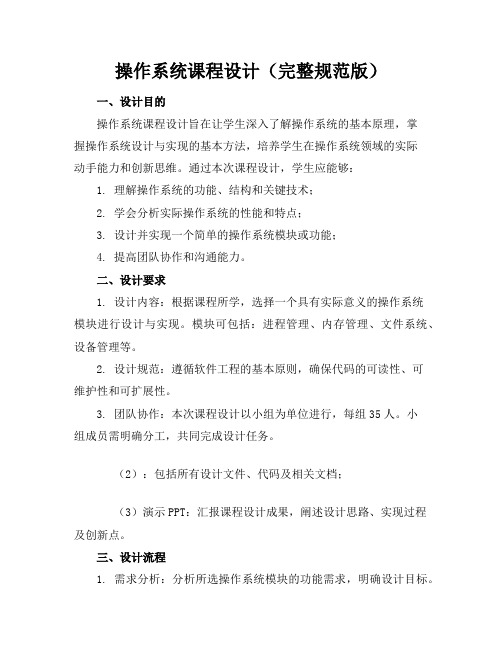
操作系统课程设计(完整规范版)一、设计目的操作系统课程设计旨在让学生深入了解操作系统的基本原理,掌握操作系统设计与实现的基本方法,培养学生在操作系统领域的实际动手能力和创新思维。
通过本次课程设计,学生应能够:1. 理解操作系统的功能、结构和关键技术;2. 学会分析实际操作系统的性能和特点;3. 设计并实现一个简单的操作系统模块或功能;4. 提高团队协作和沟通能力。
二、设计要求1. 设计内容:根据课程所学,选择一个具有实际意义的操作系统模块进行设计与实现。
模块可包括:进程管理、内存管理、文件系统、设备管理等。
2. 设计规范:遵循软件工程的基本原则,确保代码的可读性、可维护性和可扩展性。
3. 团队协作:本次课程设计以小组为单位进行,每组35人。
小组成员需明确分工,共同完成设计任务。
(2):包括所有设计文件、代码及相关文档;(3)演示PPT:汇报课程设计成果,阐述设计思路、实现过程及创新点。
三、设计流程1. 需求分析:分析所选操作系统模块的功能需求,明确设计目标。
2. 系统设计:根据需求分析,设计系统架构,划分模块,确定各模块的功能和接口。
3. 编码实现:按照系统设计,编写代码,实现各模块功能。
4. 测试与调试:对实现的系统模块进行功能测试、性能测试和兼容性测试,确保系统稳定可靠。
5. 优化与改进:根据测试结果,对系统进行优化和改进。
7. 演示与答辩:制作演示PPT,汇报课程设计成果,回答评委提问。
四、评分标准1. 设计报告(30%):内容完整、结构清晰、表述准确、格式规范。
2. 代码质量(40%):代码可读性、可维护性、可扩展性、创新性。
3. 演示与答辩(20%):PPT制作、汇报效果、回答问题。
4. 团队协作(10%):分工明确、协作高效、沟通交流。
五、预期成果1. 理论与实践相结合:将课堂上所学的操作系统理论知识运用到实际设计中,加深对操作系统的理解。
2. 技能提升:提高编程能力,掌握操作系统核心模块的设计与实现技巧。
操作系统课程设计背景
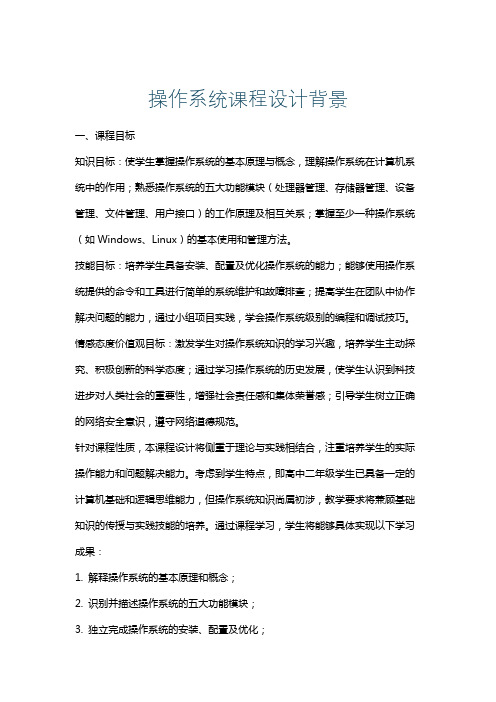
操作系统课程设计背景一、课程目标知识目标:使学生掌握操作系统的基本原理与概念,理解操作系统在计算机系统中的作用;熟悉操作系统的五大功能模块(处理器管理、存储器管理、设备管理、文件管理、用户接口)的工作原理及相互关系;掌握至少一种操作系统(如Windows、Linux)的基本使用和管理方法。
技能目标:培养学生具备安装、配置及优化操作系统的能力;能够使用操作系统提供的命令和工具进行简单的系统维护和故障排查;提高学生在团队中协作解决问题的能力,通过小组项目实践,学会操作系统级别的编程和调试技巧。
情感态度价值观目标:激发学生对操作系统知识的学习兴趣,培养学生主动探究、积极创新的科学态度;通过学习操作系统的历史发展,使学生认识到科技进步对人类社会的重要性,增强社会责任感和集体荣誉感;引导学生树立正确的网络安全意识,遵守网络道德规范。
针对课程性质,本课程设计将侧重于理论与实践相结合,注重培养学生的实际操作能力和问题解决能力。
考虑到学生特点,即高中二年级学生已具备一定的计算机基础和逻辑思维能力,但操作系统知识尚属初涉,教学要求将兼顾基础知识的传授与实践技能的培养。
通过课程学习,学生将能够具体实现以下学习成果:1. 解释操作系统的基本原理和概念;2. 识别并描述操作系统的五大功能模块;3. 独立完成操作系统的安装、配置及优化;4. 运用操作系统命令和工具进行系统维护;5. 参与小组项目,协作解决实际问题;6. 遵守网络安全规范,传播网络正能量。
二、教学内容本课程教学内容紧密围绕课程目标,以《操作系统原理与应用》教材为蓝本,科学系统地组织以下内容:1. 操作系统概述:包括操作系统的基本概念、功能、发展历程及分类。
- 教材章节:第1章 操作系统引论2. 进程与线程管理:涉及进程管理、线程管理、进程调度算法等。
- 教材章节:第2章 进程管理3. 存储管理:包括内存分配、页面置换、虚拟内存等。
- 教材章节:第3章 存储管理4. 文件系统与磁盘管理:介绍文件系统概念、磁盘空间分配、文件操作等。
操作系统概念第九版课程设计

操作系统概念第九版课程设计
1. 课程设计背景
操作系统是计算机科学中的一门重要课程,也是计算机专业的必修课程之一。
操作系统的设计和实现关系到计算机系统的性能和可靠性。
操作系统涉及到计算机系统的各个层次,因此在计算机科学中具有重要的地位。
本次课程设计旨在帮助学生更好地理解操作系统的概念和原理,并能够利用所
学知识完成一个简单的操作系统。
2. 课程设计内容
本课程设计分为两部分:操作系统概念学习和操作系统设计实践。
2.1 操作系统概念学习
操作系统概念学习分为以下几个方面:
•操作系统的历史和发展
•操作系统的功能和特征
•进程管理、内存管理和文件管理
•操作系统和硬件的关系
在学习这些概念的同时,要求学生借助操作系统概念第九版课本(Abraham Silberschatz, Peter B. Galvin, Greg Gagne合著)进行学习。
学生可以在电脑
上下载该书或者借阅实体书籍进行学习。
2.2 操作系统设计实践
操作系统设计实践部分要求学生根据所学知识设计和实现一个简单的操作系统,具体要求如下:
1。
北航操作系统课程设计

北航操作系统课程设计一、课程目标知识目标:1. 理解操作系统的基本概念、原理及功能,掌握操作系统的主要组成部分和运作机制。
2. 掌握进程管理、内存管理、文件系统、设备管理的基本原理和方法。
3. 了解操作系统在计算机系统中的地位和作用,以及操作系统的发展历程。
技能目标:1. 能够运用操作系统的基本原理,分析并解决实际问题。
2. 学会使用操作系统提供的接口和工具,编写简单的系统程序。
3. 培养操作系统配置、优化和故障排查的能力。
情感态度价值观目标:1. 培养学生对操作系统学科的兴趣,激发学习热情,形成积极向上的学习态度。
2. 培养学生的团队协作精神和沟通能力,提高解决实际问题的能力。
3. 增强学生的信息安全意识,了解操作系统安全防护的基本措施。
本课程针对北航高年级学生,课程性质为专业核心课程。
在教学过程中,注重理论与实践相结合,充分调动学生的主观能动性。
课程目标旨在使学生掌握操作系统的基础知识,培养实际操作能力,同时注重培养学生的情感态度价值观,使他们在专业知识与道德素养方面得到全面发展。
通过本课程的学习,学生将能够具备进一步研究操作系统及相关领域的能力。
二、教学内容本课程教学内容主要包括以下几部分:1. 操作系统概述:介绍操作系统的基本概念、发展历程、分类及功能。
2. 进程与线程:讲解进程管理的原理,包括进程的创建、调度、同步、互斥与死锁等内容。
3. 内存管理:阐述内存分配、回收、置换等策略,介绍虚拟内存和分页机制。
4. 文件系统:介绍文件和目录的组织结构,文件存储、访问控制、磁盘空间分配等。
5. 设备管理:讲解设备驱动程序、I/O调度策略、中断处理等内容。
6. 操作系统实例分析:以具体操作系统(如Linux)为例,分析其内核结构、源代码及功能特性。
7. 操作系统安全与保护:介绍操作系统安全机制、权限管理、加密技术等。
教学内容根据课程目标进行合理安排,注重理论与实践相结合。
教学大纲明确指出各部分内容的章节和进度,如下:第1周:操作系统概述第2-3周:进程与线程第4-5周:内存管理第6-7周:文件系统第8周:设备管理第9周:操作系统实例分析第10周:操作系统安全与保护三、教学方法为了提高教学效果,激发学生的学习兴趣和主动性,本课程采用以下多样化的教学方法:1. 讲授法:教师通过生动的语言、形象的表达,系统讲解操作系统的基本概念、原理和关键技术。
操作系统-精髓与设计原理第七版课程设计

操作系统-精髓与设计原理第七版课程设计1、引言操作系统是计算机科学中的核心概念之一,也是现代信息技术中不可或缺的重要组成部分。
操作系统课程因此成为计算机专业学生必学的考试科目之一。
操作系统-精髓与设计原理是一本广泛使用的操作系统教材,已经出版了第七版。
本文以该教材为指导,构建了一段完整的操作系统课程设计方案。
2、课程设计概述该门课程旨在通过对现代操作系统的深入理解,使学生对计算机系统的整体框架有更深刻的认知,增强学生的系统设计和实践能力。
课程设计从原理和实践两个角度出发,分为两个部分进行。
第一部分:操作系统原理该部分内容从操作系统的基本概念、经典算法到内核架构、设备驱动程序、线程和进程间的通信等方面展开。
学生应该深入理解操作系统的基本概念和原理,掌握内核架构和系统调用API的设计原理,理解进程、线程、IPC等机制的实现原理,了解操作系统的安全机制、系统性能调优和错误处理方法等。
第二部分:实践该部分主要以Linux的操作系统内核为例,让学生通过实践来应用和深入理解操作系统原理。
学生将通过编写内核模块、调试内核、部署驱动程序、编写系统调用和实现进程通信等案例,来加深对操作系统的理解和实践操作。
3、教学方法和教学手段本门课程既注重理论的学习,又重视实际操作的培养。
为了实现这一目标,教学方法和教学手段应兼备。
3.1 教学方法操作系统原理部分主要采用讲授与练习相结合的教学方法。
可以在讲解操作系统原理的同时,引导学生做练习,此外也可以进行讨论和互动,启示学生思考。
实践部分采用典型案例讲解和实践操作相结合的教学方法,讲解的同时以典型案例为基础,提供实际的问题和切入点,通过实际操作和调试来巩固学生已经学过的操作系统理论知识。
3.2 教学手段该课程采用多种教学手段,如下所述:•授课:讲授操作系统原理和案例分析等。
•实验:通过不同的实验来掌握操作系统的实现原理和内核模块编程等核心技术。
•讨论:通过小组讨论、提问互动等加强学生对理论和实践的理解。
操作系统课程设计存在问题及改进意见
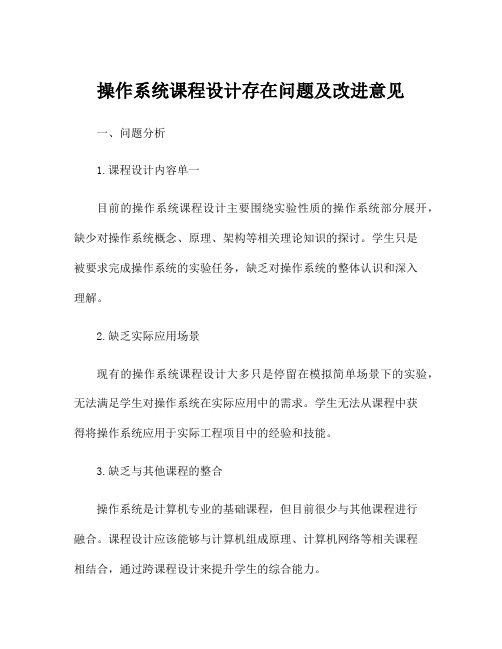
操作系统课程设计存在问题及改进意见一、问题分析1.课程设计内容单一目前的操作系统课程设计主要围绕实验性质的操作系统部分展开,缺少对操作系统概念、原理、架构等相关理论知识的探讨。
学生只是被要求完成操作系统的实验任务,缺乏对操作系统的整体认识和深入理解。
2.缺乏实际应用场景现有的操作系统课程设计大多只是停留在模拟简单场景下的实验,无法满足学生对操作系统在实际应用中的需求。
学生无法从课程中获得将操作系统应用于实际工程项目中的经验和技能。
3.缺乏与其他课程的整合操作系统是计算机专业的基础课程,但目前很少与其他课程进行融合。
课程设计应该能够与计算机组成原理、计算机网络等相关课程相结合,通过跨课程设计来提升学生的综合能力。
4.实验资源有限由于操作系统实验需要较高的计算资源和设备,学校往往无法提供足够的实验资源。
这导致学生在实验中的操作受到限制,不能充分发挥他们的创造性和实践能力。
二、改进意见1.拓展课程设计内容除了操作系统实验,课程设计还应该添加一些理论探讨的内容,包括操作系统的基本概念、原理、架构等方面的知识。
学生应该通过理论学习来获得对操作系统的整体认识,进一步探讨操作系统与其他领域的关联性。
2.引入实际应用案例课程设计应该引入一些实际应用场景,让学生能够将操作系统的知识应用于实际项目中。
可以通过与企业合作,或者模拟真实项目来设计操作系统课程,培养学生的实践能力和解决实际问题的能力。
3.与其他课程整合操作系统课程应该与其他计算机专业的相关课程进行整合,通过跨课程设计来提高学生的综合能力。
例如,可以与计算机组成原理课程结合,设计一个综合性的项目,让学生在设计操作系统的同时了解计算机硬件的工作原理。
4.提供更多实验资源学校应该增加对操作系统实验的投入,提供更多的计算资源和设备,以便学生能够自由地进行操作系统的实验设计。
在实验中,学生应该有足够的空间来尝试新的想法和创新,激发他们的创造力和实践能力。
5.强化交互与讨论课程设计应该注重学生与教师之间的交互与讨论。
- 1、下载文档前请自行甄别文档内容的完整性,平台不提供额外的编辑、内容补充、找答案等附加服务。
- 2、"仅部分预览"的文档,不可在线预览部分如存在完整性等问题,可反馈申请退款(可完整预览的文档不适用该条件!)。
- 3、如文档侵犯您的权益,请联系客服反馈,我们会尽快为您处理(人工客服工作时间:9:00-18:30)。
课程设计学生学院计算机学院专业班级12(1)班学号3112006351学生姓名吴炜文指导教师李敏2015年 1 月10 日目录1 简单文件系统…………………………………………………………文件系统一、实验目的:模拟文件管理的功能,了解各种文件的操作。
二、实验内容:1、设计一个10个用户的文件系统,每次用户可保存10个文件,一次运行用户可以打开5个文件2、程序采用二级文件目录(即设置主目录[MFD])和用户文件目录(UED)。
另外,为打开文件设置了运行文件目录(AFD)。
3、为了便于实现,对文件的读写作了简化,在执行读写命令时,只需改读写指针,并不进行实际的读写操作。
4、算法与框图:a、因系统小,文件目录的检索使用了简单的线性搜索。
b、文件保护简单使用了三位保护码:允许读写执行、对应位为1,对应位为0,则表示不允许读写、执行。
c、程序中使用的主要设计结构如下:i主文件目录和用户文件目录(MFD、UFD)ii 打开文件目录(AFD)(即运行文件目录)要求:用高级语言编写和调试一个简单的文件系统,模拟文件管理的工作过程。
从而对各种文件操作命令的实质内容和执行过程有比较深入的了解。
要求设计一个n个用户的文件系统,每次用户可保存m个文件,用户在一次运行中只能打开一个文件,对文件必须设置保护措施,且至少有Create、delete、open、close、read、write等命令。
文件系统算法的流程图如下:三、源代码及运行结果:#include "stdio.h"#include "string.h"#include "conio.h"#include "stdlib.h"#define MAXNAME 25 /*the largest length of mfdname,ufdname,filename*/#define MAXCHILD 50 /*the largest child*/#define MAX (MAXCHILD*MAXCHILD) /*the size of fpaddrno*/typedef struct /*the structure of OSFILE*/{int fpaddr; /*file physical address*/int flength; /*file length*/int fmode; /*file mode:0-Read Only;1-Write Only;2-Read and Write(default);*/ char fname[MAXNAME]; /*file name*/} OSFILE;typedef struct /*the structure of OSUFD*/{char ufdname[MAXNAME]; /*ufd name*/OSFILE ufdfile[MAXCHILD]; /*ufd own file*/}OSUFD;typedef struct /*the structure of OSUFD'LOGIN*/{char ufdname[MAXNAME]; /*ufd name*/char ufdpword[8]; /*ufd password*/} OSUFD_LOGIN;typedef struct /*file open mode*/{int ifopen; /*ifopen:0-close,1-open*/int openmode; /*0-read only,1-write only,2-read and write,3-initial*/}OSUFD_OPENMODE;OSUFD *ufd[MAXCHILD]; /*ufd and ufd own files*/OSUFD_LOGIN ufd_lp;int ucount=0; /*the count of mfd's ufds*/int fcount[MAXCHILD]; /*the count of ufd's files*/int loginsuc=0; /*whether login successfully*/char username[MAXNAME]; /*record login user's name22*/char dirname[MAXNAME];/*record current directory*/int fpaddrno[MAX]; /*record file physical address num*/OSUFD_OPENMODE ifopen[MAXCHILD][MAXCHILD]; /*record file open/close*/int wgetchar; /*whether getchar()*/FILE *fp_mfd,*fp_ufd,*fp_file_p,*fp_file;void main(){int i,j,choice1;char choice[50]; /*choice operation:dir,create,delete,open,delete,modify,read,write*/ int choiceend=1; /*whether choice end*/char *rtrim(char *str); /*remove the trailing blanks.*/char *ltrim(char *str); /*remove the heading blanks.*/void LoginF(); /*LOGIN FileSystem*/void DirF(); /*Dir FileSystem*/void CdF(); /*Change Dir*/void CreateF(); /*Create File*/void DeleteF(); /*Delete File*/void ModifyFM(); /*Modify FileMode*/void OpenF(); /*Open File*/void CloseF(); /*Close File*/void ReadF(); /*Read File*/void WriteF(); /*Write File*/void QuitF(); /*Quit FileSystem*/void help();if((fp_mfd=fopen("c:\\osfile\\mfd","rb"))==NULL){fp_mfd=fopen("c:\\osfile\\mfd","wb");fclose(fp_mfd);}for(i=0;i<MAX;i++) fpaddrno[i]=0;textattr(BLACK*16|WHITE);clrscr(); /*clear screen*/LoginF(); /*user login*/clrscr();if(loginsuc==1) /*Login Successfully*/{while (1){wgetchar=0;if (choiceend==1){printf("\n\nC:\\%s>",strupr(dirname));}else printf("Bad command or file name.\nC:\\%s>",strupr(username));gets(choice);strcpy(choice,ltrim(rtrim(strlwr(choice))));if (strcmp(choice,"dir")==0) choice1=1;else if(strcmp(choice,"creat")==0) choice1=2;else if(strcmp(choice,"delete")==0) choice1=3;else if(strcmp(choice,"attrib")==0) choice1=4;else if(strcmp(choice,"open")==0) choice1=5;else if(strcmp(choice,"close")==0) choice1=6;else if(strcmp(choice,"read")==0) choice1=7;else if(strcmp(choice,"modify")==0) choice1=8;else if(strcmp(choice,"exit")==0) choice1=9;else if(strcmp(choice,"cls")==0) choice1=10;else if(strcmp(choice,"cd")==0) choice1=11;else if(strcmp(choice,"help")==0) choice1=20;else choice1=12;switch(choice1){case 1:DirF();choiceend=1;break;case 2:CreateF();choiceend=1;if(!wgetchar) getchar();break;case 3:DeleteF();choiceend=1;if(!wgetchar)getchar();break;case 4:ModifyFM();choiceend=1;if(!wgetchar) getchar();break;case 5:choiceend=1;OpenF();if (!wgetchar) getchar();break;case 6:choiceend=1;CloseF();if (!wgetchar) getchar();break;case 7:choiceend=1;ReadF();if (!wgetchar) getchar();break;case 8:choiceend=1;WriteF();if (!wgetchar) getchar();break;case 9:printf("\nYou have exited this system.");QuitF();exit(0);break;case 10:choiceend=1;clrscr();break;case 11:CdF();choiceend=1;break;case 20:help();choiceend=1;break;default:choiceend=0;}}}else printf("\nAccess denied.");}void help(void){printf("\nThe Command List\n");printf("\nCd Attrib Creat Modify Read Open Cls Delete Exit Close\n"); }char *rtrim(char *str) /*remove the trailing blanks.*/{int n=strlen(str)-1;while(n>=0){if(*(str+n)!=' '){*(str+n+1)='\0';break;}else n--;}if (n<0) str[0]='\0';return str;}char *ltrim(char *str) /*remove the heading blanks.*/{char *rtrim(char *str);strrev(str);rtrim(str);strrev(str);return str;}void LoginF() /*LOGIN FileSystem*/{char loginame[MAXNAME],loginpw[9],logincpw[9],str[50];int i,j,flag=1;char a[25];int findout; /*login user not exist*/char *rtrim(char *str); /*remove the trailing blanks.*/char *ltrim(char *str); /*remove the heading blanks.*/void InputPW(char *password); /*input password,use '*' replace*/void SetPANo(int RorW); /*Set physical address num*/while(1){findout=0;printf("\n\nLogin Name:");gets(loginame);ltrim(rtrim(loginame));fp_mfd=fopen("c:\\osfile\\","rb");for(i=0;fread(&ufd_lp,sizeof(OSUFD_LOGIN),1,fp_mfd)!=0;i++)if (strcmp(strupr(ufd_lp.ufdname),strupr(loginame))==0){findout=1;strcpy(logincpw,ufd_lp.ufdpword);}fclose(fp_mfd);if (findout==1) /*user exist*/{printf("Login Password:");InputPW(loginpw); /*input password,use '*' replace*/if (strcmp(loginpw,logincpw)==0){strcpy(username,strupr(loginame));strcpy(dirname,username);fp_mfd=fopen("c:\\osfile\\","rb");for(j=0;fread(&ufd_lp,sizeof(OSUFD_LOGIN),1,fp_mfd)!=0;j++){strcpy(str,"c:\\osfile\\");strcat(str,ufd_lp.ufdname);ufd[j]=(OSUFD*)malloc(sizeof(OSUFD));strcpy(ufd[j]->ufdname,strupr(ufd_lp.ufdname));fp_ufd=fopen(str,"rb");fcount[j]=0;for(i=0;fread(&ufd[j]->ufdfile[i],sizeof(OSFILE),1,fp_ufd)!=0;i++,fcount[j]++){ifopen[j][i].ifopen=0;ifopen[j][i].openmode=4;}fclose(fp_ufd);}fclose(fp_mfd);ucount=j;SetPANo(0);printf("\n\nLogin successful! Welcome to this FileSystem\n\n");loginsuc=1;return;}else{printf("\n\n");flag=1;while(flag){printf("Login Failed! Password Error. Try Again(Y/N):");gets(a);ltrim(rtrim(a));if (strcmp(strupr(a),"Y")==0) {loginsuc=0;flag=0;}else if(strcmp(strupr(a),"N")==0){loginsuc=0;flag=0;return;}}} }else{printf("New Password(<=8):");InputPW(loginpw); /*input new password,use '*' replace*/printf("\nConfirm Password(<=8):"); /*input new password,use '*' replace*/InputPW(logincpw);if (strcmp(loginpw,logincpw)==0){strcpy(ufd_lp.ufdname,strupr(loginame));strcpy(ufd_lp.ufdpword,loginpw);fp_mfd=fopen("c:\\osfile\\","ab");fwrite(&ufd_lp,sizeof(OSUFD_LOGIN),1,fp_mfd);fclose(fp_mfd);strcpy(username,strupr(loginame));strcpy(dirname,loginame);strcpy(str,"c:\\osfile\\");strcat(str,username);if((fp_ufd=fopen(str,"rb"))==NULL){fp_ufd=fopen(str,"wb");fclose(fp_ufd);}fp_mfd=fopen("c:\\osfile\\","rb");for(j=0;fread(&ufd_lp,sizeof(OSUFD_LOGIN),1,fp_mfd)!=0;j++){strcpy(str,"c:\\osfile\\");strcat(str,ufd_lp.ufdname);ufd[j]=(OSUFD*)malloc(sizeof(OSUFD));strcpy(ufd[j]->ufdname,strupr(ufd_lp.ufdname));fp_ufd=fopen(str,"rb");for(i=0;fread(&ufd[j]->ufdfile[i],sizeof(OSFILE),1,fp_ufd)!=0;i++,fcount[j]++){ifopen[j][i].ifopen=0;ifopen[j][i].openmode=4;}fclose(fp_ufd);}fclose(fp_mfd);ucount=j;SetPANo(0);printf("\n\nLogin Successful! Welcome to this System\n\n");loginsuc=1;return;}else{printf("\n\n");flag=1;while(flag){printf("Login Failed! Password Error. Try Again(Y/N):");gets(a);ltrim(rtrim(a));if (strcmp(strupr(a),"Y")==0) {loginsuc=0;flag=0;}else if(strcmp(strupr(a),"N")==0){loginsuc=0;flag=0;return;}} } } } }void SetPANo(int RorW) /*Set physical address num,0-read,1-write*/{int i,j;if (RorW==0){if((fp_file_p=fopen("c:\\osfile\\file\\file_p","rb"))==NULL){fp_file_p=fopen("c:\\osfile\\file\\file_p","wb");fclose(fp_file_p);}fp_file_p=fopen("c:\\osfile\\file\\file_p","rb");for(i=0;fread(&j,sizeof(int),1,fp_file_p)!=0;i++)fpaddrno[j]=1;/*for(i=1;i<MAX;i++)if ((i%13)==0) fpaddrno[i]=1;*/}else{fp_file_p=fopen("c:\\osfile\\file\\file_p","wb");/*for(i=1;i<MAX;i++)if((i%13)==0) fpaddrno[i]=0;*/for(i=0;i<MAX;i++)if (fpaddrno[i]==1)fwrite(&i,sizeof(int),1,fp_file_p);}fclose(fp_file_p);}void InputPW(char *password) /*input password,use '*' replace*/{int j;for(j=0;j<=7;j++){password[j]=getch();if ((int)(password[j])!=13){if((int)(password[j])!=8)putchar('*');else{if (j>0){j--;j--;putchar('\b');putchar(' ');putchar('\b');}else j--;}}else{password[j]='\0';break;}}password[j]='\0';}void DirF() /*Dir FileSystem*/{int i,j,count=0;char sfmode[25],sfpaddr[25],str[25];int ExistD(char *dirname); /*Whether DirName Exist,Exist-i,Not Exist-0*/clrscr();if (strcmp(strupr(ltrim(rtrim(dirname))),"")!=0){printf("\n\nC:\\%s>dir\n",dirname);printf("\n%14s%16s%14s%10s%18s\n","FileName","FileAddress","FileLength","Type","FileMode") ;j=ExistD(dirname);for(i=0;i<fcount[j];i++){if ((i%16==0)&&(i!=0)){printf("\nPress any key to continue..");getch();clrscr();printf("\n%14s%16s%14s%10s%18s\n","FileName","FileAddress","FileLength","Type","FileMode") ;}itoa(ufd[j]->ufdfile[i].fpaddr,str,10);strcpy(sfpaddr,"file");strcat(sfpaddr,str);if (ufd[j]->ufdfile[i].fmode==0) strcpy(sfmode,"Read Only");else if(ufd[j]->ufdfile[i].fmode==1) strcpy(sfmode,"Write Only");else if(ufd[j]->ufdfile[i].fmode==2)strcpy(sfmode,"Read And Write");else strcpy(sfmode,"Protect");printf("%14s%16s%14d%10s%18s\n",ufd[j]->ufdfile[i].fname,sfpaddr,ufd[j]->ufdfile[i].flength,"< FILE>",sfmode);}printf("\n %3d file(s)\n",fcount[j]);}{printf("\n\nC:\\>dir\n");printf("\n%14s%18s%8s\n","DirName","OwnFileCount","Type");for(i=0;i<ucount;i++){if ((i%16==0)&&(i!=0)){printf("\nPress any key to continue...");getch();clrscr();printf("\n%14s%18s%8s\n","DirName","OwnFileCount","Type");}printf("%14s%18d%8s\n",ufd[i]->ufdname,fcount[i],"<UFD>");count=count+fcount[i];}printf("\n %3d dir(s),%5d file(s)\n",ucount,count);}}int ExistD(char *dirname) /*Whether DirName Exist,Exist-i,Not Exist-0*/{int i;int exist=0;for(i=0;i<ucount;i++)if (strcmp(strupr(ufd[i]->ufdname),strupr(dirname))==0){exist=1;break;}if (exist) return(i);else return(-1);}void CdF() /*Exchange Dir*/{char dname[MAXNAME];char *rtrim(char *str); /*remove the trailing blanks.*/char *ltrim(char *str); /*remove the heading blanks.*/int ExistD(char *filename); /*Whether FileName Exist,Exist-i,Not Exist-0*/ printf("\nPlease input DirName (cd..-Previous dir; DirNAME-cd [DirNAME]):"); gets(dname);ltrim(rtrim(dname));if (ExistD(dname)>=0) strcpy(dirname,strupr(dname));else if(strcmp(strupr(dname),"CD..")==0) strcpy(ltrim(rtrim(dirname)),""); else printf("\nError.\'%s\' does not exist.\n",dname);}void CreateF() /*Create File*/{int fpaddrno,flag=1,i;char fname[MAXNAME],str[50],str1[50],strtext[255],a[25];char fmode[25];char *rtrim(char *str); /*remove the trailing blanks.*/char *ltrim(char *str); /*remove the heading blanks.*/int FindPANo(); /*find out physical address num*/int WriteF1(); /*write file*/int ExistF(char *filename); /*Whether FileName Exist,Exist-i,Not Exist-0*/int ExistD(char *dirname);if (strcmp(strupr(dirname),strupr(username))!=0){printf("\nError. You must create file in your own dir.\n");wgetchar=1;}else{ printf("\nPlease input FileName:");gets(fname);ltrim(rtrim(fname));if (ExistF(fname)>=0){printf("\nError. Name \'%s\' has already existed.\n",fname);wgetchar=1;else{printf("Please input FileMode(0-Read Only, 1-Write Only, 2-Read and Write, 3-Protect):");gets(fmode);ltrim(rtrim(fmode));if((strcmp(fmode,"0")==0)||(strcmp(fmode,"1")==0)||(strcmp(fmode,"2")==0)||(strcmp(fmode, "3")==0)){fpaddrno=FindPANo();if (fpaddrno>=0){i=ExistD(username);strcpy(ufd[i]->ufdfile[fcount[i]].fname,fname);ufd[i]->ufdfile[fcount[i]].fpaddr=fpaddrno;ufd[i]->ufdfile[fcount[i]].fmode=atoi(fmode);ifopen[i][fcount[i]].ifopen=0;ifopen[i][fcount[i]].openmode=4;strcpy(str,"c:\\osfile\\file\\file");itoa(fpaddrno,str1,10);strcat(str,str1);fp_file=fopen(str,"wb");fclose(fp_file);fcount[i]++;while(flag){printf("Input text now(Y/N):");gets(a);ltrim(rtrim(a));ufd[i]->ufdfile[fcount[i]-1].flength=0;if(strcmp(strupr(a),"Y")==0){fp_file=fopen(str,"wb+");ufd[i]->ufdfile[fcount[i]-1].flength=WriteF1();flag=0;}else if(strcmp(strupr(a),"N")==0){flag=0;wgetchar=1;}}printf("\n\'%s\' has been created successfully!\n",fname);}else{printf("\nFail!No Disk Space. Please format your disk.\n");wgetchar=1;}}else {printf("\nError. FileMode\'s Range is 0-3\n");wgetchar=1;}}}}int ExistF(char *filename) /*Whether FileName Exist,Exist-i,Not Exist-0*/{int i,j;int exist=0;int ExistD(char *dirname);j=ExistD(dirname);for(i=0;i<fcount[j];i++)if (strcmp(strupr(ufd[j]->ufdfile[i].fname),strupr(filename))==0){exist=1;break;}if (exist) return(i);else return(-1);}int FindPANo() /*find out physical address num*/{int i;for(i=0;i<MAX;i++)if (fpaddrno[i]==0) {fpaddrno[i]=1;break;}if (i<MAX) return(i);else return(-1);}int WriteF1() /*write file*/{int length=0;char c;printf("Please input text(\'#\' stands for end):\n");while((c=getchar())!='#'){fprintf(fp_file,"%c",c);if (c!='\n') length++;}fprintf(fp_file,"\n");fclose(fp_file);return(length);}void DeleteF() /*Delete File*/{char fname[MAXNAME];char str[50],str1[50];int i,j,k,flag=1;char a[25]; /*whether delete*/char *rtrim(char *str); /*remove the trailing blanks.*/char *ltrim(char *str); /*remove the heading blanks.*/int ExistF(char *filename); /*Whether FileName Exist,Exist-i,Not Exist-0*/int ExistD(char *dirname);if (strcmp(strupr(dirname),strupr(username))!=0){printf("\nError. You can only delete file in your own dir.\n");wgetchar=1;}else{printf("\nPlease input FileName:");gets(fname);ltrim(rtrim(fname));i=ExistF(fname);if (i>=0){k=ExistD(username);if(ifopen[k][i].ifopen==1){printf("\nError. \'%s\' is in open status. Close it before delete.\n",fname);wgetchar=1;} else{ while(flag){printf("\'%s\' will be deleted. Are you sure(Y/N):",fname);gets(a);ltrim(rtrim(a));if(strcmp(strupr(a),"Y")==0){fpaddrno[ufd[k]->ufdfile[i].fpaddr]=0;itoa(ufd[k]->ufdfile[i].fpaddr,str,10);for(j=i;j<fcount[k]-1;j++){strcpy(ufd[k]->ufdfile[j].fname,ufd[k]->ufdfile[j+1].fname);ufd[k]->ufdfile[j].fpaddr=ufd[k]->ufdfile[j+1].fpaddr;ufd[k]->ufdfile[j].flength=ufd[k]->ufdfile[j+1].flength;ufd[k]->ufdfile[j].fmode=ufd[k]->ufdfile[j+1].fmode;ifopen[k][j]=ifopen[k][j+1];}fcount[k]--;strcpy(str1,"c:\\osfile\\file\\file");strcat(str1,str);remove(str1);flag=0;printf("\n\'%s\' has been deleted successfully.\n",fname);wgetchar=1;}else if(strcmp(strupr(a),"N")==0){printf("\nError. \'%s\' hasn\'t been deleted.\n",fname);wgetchar=1;flag=0;}}}}else{printf("\nError. \'%s\' does not exist.\n",fname);wgetchar=1;}}}void ModifyFM() /*Modify FileMode*/{char fname[MAXNAME],str[50];int i,j,k,flag;char fmode[25]; /*whether delete*/char *rtrim(char *str); /*remove the trailing blanks.*/char *ltrim(char *str); /*remove the heading blanks.*/void InputPW(char *password); /*input password,use '*' replace*/void SetPANo(int RorW); /*Set physical address num*/int ExistF(char *filename); /*Whether FileName Exist,Exist-i,Not Exist-0*/int ExistD(char *dirname);if (strcmp(strupr(dirname),strupr(username))!=0) {printf("\nError.You can only modify filemode in yourself dir.\n");wgetchar=1;}else{ printf("\nPlease input FileName:");gets(fname);ltrim(rtrim(fname));i=ExistF(fname);if (i>=0){k=ExistD(username);if(ifopen[k][i].ifopen==1){printf("\nError.\'%s\' is in open status. Close it before modify.\n",fname);wgetchar=1;} else{if(ufd[k]->ufdfile[i].fmode==0) strcpy(str,"read only"); /*FileMode*/else if(ufd[k]->ufdfile[i].fmode==1) strcpy(str,"write only");else if(ufd[k]->ufdfile[i].fmode==2) strcpy(str,"read and write");else strcpy(str,"Protect");printf("\'%s\' filemode is %s.\n",fname,strupr(str));printf("Modify to(0-read only,1-write only,2-read and write,3-Protect):");gets(fmode);ltrim(rtrim(fmode));if(strcmp(fmode,"0")==0){ufd[k]->ufdfile[i].fmode=0;printf("\n\'%s\' has been modified to READ ONLY mode successfully.\n",fname);wgetchar=1;}else if(strcmp(fmode,"1")==0){ufd[k]->ufdfile[i].fmode=1;printf("\n\'%s\' has been modified to WRITE ONLY mode successfully.\n",fname);wgetchar=1;}else if(strcmp(fmode,"2")==0){ufd[k]->ufdfile[i].fmode=2;printf("\n\'%s\' has been modified to READ AND WRITE mode successfully.\n",fname);wgetchar=1;}else if(strcmp(fmode,"3")==0){ufd[k]->ufdfile[i].fmode=3;printf("\n\'%s\' has been modified to FORBID mode successfully.\n",fname);wgetchar=1;}else {printf("\nError.\'%s\' is not modified.\n",fname);wgetchar=1;}}}else{printf("\nError. \'%s\' dose not exist.\n",fname);wgetchar=1;}}}void OpenF() /*Open File*/{char fname[MAXNAME];char str[25],str1[25],fmode[25];int i,k;char *rtrim(char *str); /*remove the trailing blanks.*/char *ltrim(char *str); /*remove the heading blanks.*/int ExistF(char *filename); /*Whether FileName Exist,Exist-i,Not Exist-0*/int ExistD(char *dirname);if (strcmp(strupr(ltrim(rtrim(dirname))),"")==0){printf("\nError. Please change to ufd dir before open.\n");wgetchar=1;return;}printf("\nPlease input FileName:");gets(fname);ltrim(rtrim(fname));i=ExistF(fname);if (i>=0){k=ExistD(dirname);if(!ifopen[k][i].ifopen){if (ufd[k]->ufdfile[i].fmode==3){printf("\nError. The file\'s mode is FORBID. Can not open.\n");wgetchar=1;}else{printf("Please input FileOpenMode(0-Read Only,1-Write Only,2-Read and Write):");gets(fmode);ltrim(rtrim(fmode));if((strcmp(fmode,"0")==0)||(strcmp(fmode,"1")==0)||(strcmp(fmode,"2")==0)){if(fmode[0]=='0') /*open file with read only mode*/{strcpy(str,"read only");if((ufd[k]->ufdfile[i].fmode==0)||(ufd[k]->ufdfile[i].fmode==2)) ifopen[k][i].ifopen=1;}else if(fmode[0]=='1') /*open file with write only mode*/{strcpy(str,"write only");if((ufd[k]->ufdfile[i].fmode==1)||(ufd[k]->ufdfile[i].fmode==2)) ifopen[k][i].ifopen=1;}else if(fmode[0]=='2') /*open file with read and write mode*/{strcpy(str,"read and write");if(ufd[k]->ufdfile[i].fmode==2) ifopen[k][i].ifopen=1;}if(ufd[k]->ufdfile[i].fmode==0) strcpy(str1,"read only"); /*FileMode*/else if(ufd[k]->ufdfile[i].fmode==1) strcpy(str1,"write only");else if(ufd[k]->ufdfile[i].fmode==2) strcpy(str1,"read and write");if(ifopen[k][i].ifopen==1){ifopen[k][i].openmode=atoi(fmode);if (ifopen[k][i].openmode==0) strcpy(str,"read only");else if(ifopen[k][i].openmode==1) strcpy(str,"write only");else if(ifopen[k][i].openmode==2) strcpy(str,"read and write");printf("\n\'%s\' has been opened. OpenMode is %s,FileMode is %s\n",fname,strupr(str),strupr(str1));wgetchar=1;}else{printf("\nError. \'%s\' hasn\'t been opened. OpenMode Error. OpenMode is %s,butFileMode is %s\n",fname,strupr(str),strupr(str1));wgetchar=1;}}else {printf("\nError. FileOpenMode\'s Range is 0-2\n");wgetchar=1;}}}else {printf("\nError. \'%s\' is in open status.\n",fname);wgetchar=1;}}else{printf("\nError. \'%s\' does not exist.\n",fname);wgetchar=1;}}void CloseF() /*Close File*/{int i,k,n=0;char fname[MAXNAME];char *rtrim(char *str); /*remove the trailing blanks.*/char *ltrim(char *str); /*remove the heading blanks.*/int ExistF(char *filename); /*Whether FileName Exist,Exist-i,Not Exist-0*/int ExistD(char *dirname);if (strcmp(strupr(ltrim(rtrim(dirname))),"")==0){printf("\nError. Please convert to ufd dir before close.\n");wgetchar=1;return;}k=ExistD(dirname);printf("\nOpen File(s) In This Ufd:\n");/*display openned file*/for(i=0;i<fcount[k];i++){if (ifopen[k][i].ifopen==1) {printf("%15s",ufd[k]->ufdfile[i].fname);n++;}if((n%4==0)&&(n!=0)) printf("\n");}printf("\n%d files openned.\n",n);if (n==0) wgetchar=1;if(n!=0){printf("\nPlease input FileName:");gets(fname);ltrim(rtrim(fname));i=ExistF(fname);if(i>=0){if(ifopen[k][i].ifopen==1){ifopen[k][i].ifopen=0;ifopen[k][i].openmode=4;printf("\n\'%s\' has been closed successfully.\n",fname);wgetchar=1;}else {printf("\nError.\'%s\' is in closing status.\n",fname);wgetchar=1;}}else {printf("\nError. \'%s\' is not exist.\n",fname);wgetchar=1;}}}void ReadF() /*Read File*/{int i,k,n=0;char fname[MAXNAME];char str[255],str1[255],c;char *rtrim(char *str); /*remove the trailing blanks.*/char *ltrim(char *str); /*remove the heading blanks.*/int ExistF(char *filename); /*Whether FileName Exist,Exist-i,Not Exist-0*/int ExistD(char *dirname);if (strcmp(strupr(ltrim(rtrim(dirname))),"")==0) {printf("\nError.Please convert to ufd dir before read.\n");wgetchar=1;return;}printf("\nCaution:Open file first\n");printf("Opened File(s) List:\n");k=ExistD(dirname);for(i=0;i<fcount[k];i++){if (ifopen[k][i].ifopen==1)if ((ifopen[k][i].openmode==0) ||(ifopen[k][i].openmode==2)) {printf("%15s",ufd[k]->ufdfile[i].fname);n++;}if((n%4==0)&&(n!=0)) printf("\n");}printf("\n%d files openned.\n",n);if (n==0) wgetchar=1;if(n!=0){printf("\nPlease input FileName:");gets(fname);ltrim(rtrim(fname));i=ExistF(fname);if(i>=0){if(ifopen[k][i].ifopen==1){if((ifopen[k][i].openmode==0) ||(ifopen[k][i].openmode==2)){itoa(ufd[k]->ufdfile[i].fpaddr,str,10);strcpy(str1,"file");strcat(str1,str);strcpy(str,"c:\\osfile\\file\\");strcat(str,str1);fp_file=fopen(str,"rb");fseek(fp_file,0,0);printf("\nThe text is:\n\n");printf(" ");while(fscanf(fp_file,"%c",&c)!=EOF)if (c=='\n') printf("\n ");else printf("%c",c);printf("\n\n%d Length.\n",ufd[k]->ufdfile[i].flength);fclose(fp_file);wgetchar=1;}else{printf("\nError.\'%s\' has been opened with WRITE ONLY mode. It isn\'t read.\n",fname);wgetchar=1;}}else {printf("\nError.\'%s\' is in closing status. Please open it before read\n",fname);wgetchar=1;}}else {printf("\nError. \'%s\' does not exist.\n",fname);wgetchar=1;}}}void WriteF() /*Write File*/{int i,k,n=0;char fname[MAXNAME];char str[50],str1[50],a[50];char *rtrim(char *str); /*remove the trailing blanks.*/char *ltrim(char *str); /*remove the heading blanks.*/int ExistF(char *filename); /*Whether FileName Exist,Exist-i,Not Exist-0*/int ExistD(char *dirname);int WriteF1(); /*write file*/if (strcmp(strupr(ltrim(rtrim(dirname))),"")==0) {printf("\nError. Please convert to ufd dir before write.\n");wgetchar=1;return;}k=ExistD(dirname);printf("\nOpen File(s) with write only mode or read and write mode:\n");/*display openned files with writable mode*/for(i=0;i<fcount[k];i++){if (ifopen[k][i].ifopen==1)if ((ifopen[k][i].openmode==1) ||(ifopen[k][i].openmode==2)) {printf("%15s",ufd[k]->ufdfile[i].fname);n++;}if((n%4==0)&&(n!=0)) printf("\n");}printf("\n%d files open.\n",n);if (n==0) wgetchar=1;if(n!=0){printf("\nPlease input FileName:");gets(fname);ltrim(rtrim(fname));i=ExistF(fname);if(i>=0){if(ifopen[k][i].ifopen==1){if((ifopen[k][i].openmode==1) ||(ifopen[k][i].openmode==2)){itoa(ufd[k]->ufdfile[i].fpaddr,str,10);strcpy(str1,"file");strcat(str1,str);strcpy(str,"c:\\osfile\\file\\");strcat(str,str1);if (ufd[k]->ufdfile[i].flength!=0){printf("\n\'%s\' has text. Overwrite or Append(O-overwrite,A-Append,else-not write):",fname);gets(a);ltrim(rtrim(a));if (fp_file!=NULL) fclose(fp_file);if (strcmp(strupr(a),"O")==0){printf("\nOverwrite\n");fp_file=fopen(str,"wb");ufd[k]->ufdfile[i].flength=0;ufd[k]->ufdfile[i].flength=WriteF1();}else if(strcmp(strupr(a),"A")==0){printf("\nAppend\n");fp_file=fopen(str,"ab");ufd[k]->ufdfile[i].flength=ufd[k]->ufdfile[i].flength+WriteF1();}else{printf("\nError.\'%s\' has not been written.\n",fname);fclose(fp_file);wgetchar=1;}}else{fp_file=fopen(str,"wb");ufd[k]->ufdfile[i].flength=WriteF1();} }else{printf("\nError. \'%s\' has been opened with read only mode.It isn\'t writed.\n",fname);wgetchar=1;}}else{printf("\nError. \'%s\' is in closing status. Please open it before write\n",fname);wgetchar=1;}}else{printf("\nError. \'%s\' does not exist.\n",fname);wgetchar=1;}}}void QuitF() /*Quit FileSystem*/{int i,j;char str[50];void SetPANo(int RorW); /*Set physical address num,0-read,1-write*/。
